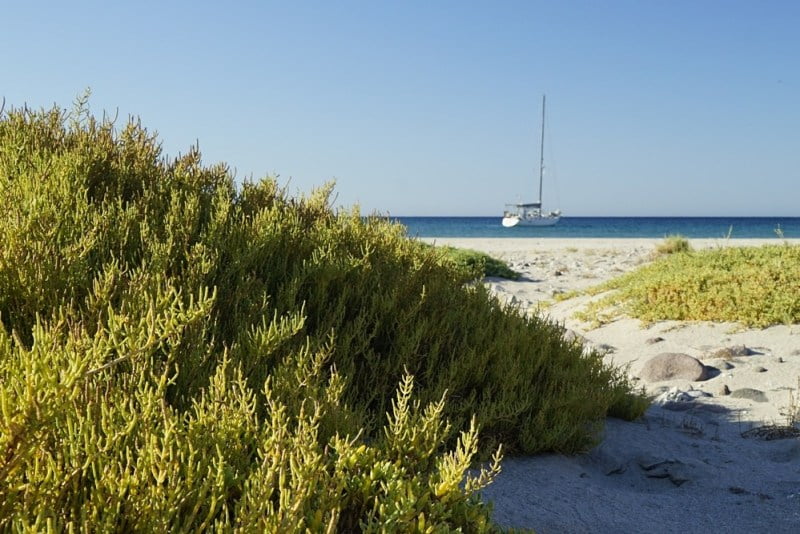The flavor of places we visit as cruisers is a meaningful part of the joy of cruising. The literal flavor: the sourcing, preparing, and enjoying of food connects us to sweet memories. What’s more local and connected than foraging for sustenance?

I remember toddling after my aunties to eat more blackberries than I could pick, and savoring the pies from what they collected later. There was that time my grandmother said “oh LOOK! pull over, quick!” because she saw shaggy mane mushrooms in a drift on a lawn near my father’s office. I can remember wearing a baby while chatting with a friend and snipping nettle leaves into a paper bag to turn into soup at home, and the morels in our yard that first spring we moved to Bainbridge felt like an auspicious sign.
Going cruising meant leaving foraging behind, other than fishing (and isn’t that more hunting more than foraging?). Without local knowledge – what to look for, what’s safe, what’s not – how could it come with us? And yet it can, and has crept back into our life recently.
A book, a gift, and an accidental discovery have returned this flavorsome pastime. It began with rereading Gathering the Desert, which reminded me how foraged ingredients, botany, and human ecology come together here in the Sonora desert. The book explores twelve different foods in terms of their botanical and cultural connection – including the tiny, wild chiltepin pepper. The following week, Don Juan and senora Cuquita, the lovely couple whose food service we regularly patronize, gifted a small bag of these fiery little chiles (not much bigger than an actual peppercorn) with our purchase. Around the same time, I had spotted greens growing behind the high tide line that proved to be the same “sea bean” we frequently foraged in Puget Sound. Foraging interest… rekindled!

Sea beans (also called sea asparagus, pickleweed, or samphire) are a succulent that thrives in an astonishing range of environments, subtropic to subarctic. Prior to finding it behind a recent anchorage, I’d never have expected this low-growing plant we’d gather in Puget Sound to be present in the parched desert of Baja. And yet there it was, looking and feeling so familiar…roots reaching into brackish water, the sectioned stems snapping neatly between fingers.

Soaked, blanched, then sautéed in butter – they are delicious. The plants naturally have a high salt content: blanch first, then no additional salt is needed. Collectors tips: snip the tender top shoots, lower stems are woody; don’t take whole plants, as it grows from a rhizome that should be left behind. It’s very much a fresh green bean flavor, and lends itself to both salt fermenting and pickling if you’d like to preserve a jar for later.

I mentioned to Don Juan (we chat via Whatsapp, the easier to use Google Translate!) that Jamie appreciated the spicy peppers; last week, he tucked a bag of several dozen for us to discover when unpacking our order aboard Totem. They’re said to lend a unique flavor to Sonora salsas; folklore connects them to creation stories and medicinal use. We’ve made them into a homemade chili-garlic sauce, heated up a chimichurri, and will try the last few in another traditional style- ground in a mortar with salt and sprinkled directly on food.
The CSA box we get from San Javier farmers often contains a little surprise, too: something new to try. The crowd favorite on Totem is the fig jam that Farmer Bastida has brought recently. Last week’s basket had something I couldn’t quite identify. An email to the CSA’s organizer, Cecilia, led to illumination that these are ‘tuna’ – not the fish, but the fruit of the opuntia cactus.

We cook and eat the nopales, the green paddles from this same cactus. The fruit was more challenging: eating around the generously sized seeds is likely an acquired practice. The taste, however, is not: the prickly pear is refreshing, delicious, and very similar to their namesake.

I’ve loaded up my kindle with more books to connect with the environment around us. In Coves of Departure, I’m seeing Baja through the eyes of a professor guiding an annual group of students through southern Baja waters and ecology. Into a Desert Place is the entertaining and occasionally poignant trek of a bumbling Scot who set out to walk the coast of Baja. He did it, and cactus was common to his diet. It makes what we can find and eat locally that much more interesting, and help us feel more connected to the place.
Meanwhile: here on Totem, besides stuffing ourselves with Baja goodness – Siobhan has turned our jicama bounty into “jicama fries” and they are better than you think; we have cornbread cooling and to go with the arrachera that will get dolloped with chiltepin-infused chimichurri tonight; there’s a plate of chocolate chip cookies (thank you, teens who bake) on the counter.
Hurricane Genevieve is in the neighborhood! She’s wobbling to the outside of Baja, but we did make a short jaunt to an anchorage with better protection, along with other preparations. The action is south, and all’s well aboard.

TOTEM TALKS: Stop Fishing, Start Catching!
Fishing is more like hunting than foraging, but it’s something most cruisers aspire to do… and most of us don’t do it very well! Our friend Kevin Ferrie (of Live the Voyage and Sail Fish Tales) is That Guy: the one who always has a picture of the incredible catch, and not just the story but the footage to show the one that got away, the sailfish he released, the mahi bigger than his kid, etc. He’s going to tell us what most cruisers get wrong about fishing, and how to have skill instead of luck.
Join us to hear his best advice over a sundowner: Saturday, August 22 at 5:00 pm PT, 8:00 pm ET. Register here to attend.
